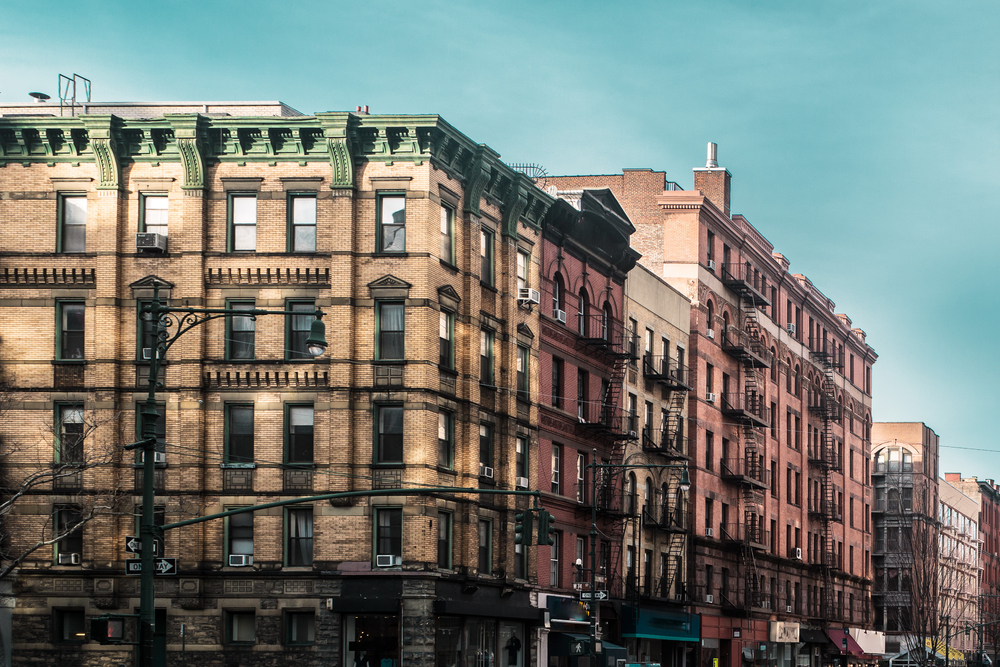What Is a Condop?

If you have ever searched for real estate in New York City, then you probably know about condos and co-ops. These are two distinct styles of apartment building. They are structured differently, managed differently, and priced differently. However, did you know there is a third option? The rare condop combines aspects of condos and co-ops, making them a fascinating NYC real estate unicorn.
On this page, we will walk you through everything you want to know about condops–their history, their distinct characteristics, and how you can find one to call home.
Types of NYC Apartment Buildings: Condos, Co-ops, and Condops
Before you can understand what a condop is, you will need to know the difference between condominiums (aka condos) and co-ops. Here is a quick refresher.
Condominiums

Condominiums are a type of multifamily housing where you can purchase the real property itself. It is pretty straightforward; when you buy a condo, you are buying the actual square footage inside of your unit. It belongs to you, and you can do what you want with it as long as you abide by the building’s basic rules.
Condominiums come with a few major perks:
- Property owners enjoy a greater degree of freedom.
- The purchasing process is easier than in co-ops. No co-op boards here.
- Sponsor units are likely to be condos. Buying a sponsor unit further streamlines the buying process.
- Condos tend to be newer.
- Condos tend to have better amenities.
However, there are also some drawbacks:
- Condos tend to be more expensive than co-ops.
- You will have less control over the building’s management than in co-ops where you can run for the board or influence its members.
Co-ops

With co-ops, you are not able to purchase the real property. You are not buying the unit itself. Instead, you are buying shares in a corporation–the corporation of the building. By purchasing these shares, you are granted the right to occupy an area of the building. The amount of shares you purchase are commensurate with the size of your apartment. Your shares will also include a portion of the communal space.
Some benefits of co-ops include:
- Co-ops foster a sense of community and responsibility for the building as a whole
- Co-ops tend to be less expensive than condos.
- You are more likely to find historical buildings as co-ops.
- If your building doesn’t have many amenities, you can save on your monthly maintenance fees.
Some drawbacks of co-ops include:
- Co-ops have a more convoluted purchase process than condos.
- Co-op boards can restrict your freedom to do as you wish with your own apartment.
- Since co-ops are often in older buildings, they tend to not have the newest and best amenities.
Condops

A condop is a combination of a condo and a co-op. Typically, condops are mixed-use condominium buildings with a residential portion that is owned by a co-op. So how exactly does this work?
Typically, the lower floors of the building are real property that can be purchased by a business or company. It can be turned into office space, retail space, or parking. Oftentimes, it is a combination of all three. This commercial space is operated and managed by the building’s board, the same way as it would be in any other condominium.
The co-op portion of the building is usually located above this commercial space. It is sold as a single condo unit to the co-op board, who can then run the co-op as it sees fit. The co-op board operates much as it would in purely residential co-op buildings, except it also needs to interface with the condo building’s board when it comes to things that impact the entire building.
Pros and Cons of Condop Buildings

There are some unique benefits and drawbacks to living and owning property in a condo-op. Here are the pros and cons you should consider before buying a co-op unit in a condominium building.
Pros of Condop Buildings
With a condop building, you get the benefits of having a co-op board, such as having a greater say in the ways in which your apartment is managed. You can run for a co-op board seat, and you can lobby for important changes. Everything from proposed amenities, to rule changes and monthly maintenance fees goes through the co-op board. This does not change just because the co-op is located in a mixed use condo building.
Other benefits include the convenience of having businesses inside of the building. This will vary largely from building to building. For example, office space may not offer as many perks as say a downstairs gym, restaurant, or store. However, if you value peace and quiet, downstairs office space can offer the building a strong source of income without the added noises, smells, and vermin associated with some retail establishments like bars and restaurants.
Cons of Condop Buildings
If you are trying to purchase a unit in a condop, your purchasing process will likely look very similar to any other co-op purchase. You will need to apply to the co-op board and jump through all required hoops before you can close. Once you have purchased your shares, the ways in which you can use your space will be limited by the co-op board’s rules. You can review these rules in the offer plan before you buy.
As the owner of a condop unit, you will not have any say in how the commercial space in the building is used. New York is a competitive market for businesses, so the tenants downstairs can change quickly and unpredictably. You have to be prepared for this possibility when you purchase a condop unit.
As long as you do your research on the specifics of your condop, you can find a situation that works well for you and your individual needs. Be sure to thoroughly review the offering plan you are given before purchase. Also, take a close look at the financials and any history of lawsuits between the co-op and their commercial neighbors. Know what you are getting into before closing on your condop unit.
Condop FAQs

Still curious about condops? Here are answers to some frequently asked questions about these rare apartments.
What Is the History of the Condop?
Condops first began to pop up in New York City in the 1960s, according to the New York Times. The emergence of condops came about because developers wanted to separate the residential portions of their buildings from the commercial portions. This allowed developers to more easily create mixed use buildings while still attracting co-op loving New Yorkers.
Condops gained greater popularity in NYC in the 1980s. This was because of a tax break called the 80/20 rule. This rule barred co-op owners from taking advantage of NYC’s homeowner tax breaks if they got more than 20 percent of their income from commercial renters. By legally separating the co-op’s operations from the commercial condo units, they were able to fully benefit from homeowner income tax deductions.
The 80/20 rule was altered in 2008. Now, co-ops can raise rents on their commercial tenants to match market rates without suffering tax penalties. This eliminates the incentive to sever the co-op and condo portions of the building, making condops less appealing. However, the NYC tax and building codes are ever changing. It is possible condops may see a resurgence in the future, depending on choice made in Albany or the New York City Council.
Where Can You Find a Condop?
Condops are most common in Manhattan. You can find them concentrated on the Eastern side of the island, in the Upper East Side, Murray Hill, and Lenox Hill.
How Common Are Condops in NYC?
Condops are pretty rare. According to a report by the New York Times in 2008, there were less than 300 condop buildings in NYC. Since condops have not been particularly popular in recent decades, it is unlikely that that number has risen by much.
Aren’t Condops Co-ops With Condo Rules?
This is a common misconception. Sometimes, brokers, real estate agents, and sellers market a co-op unit as a “condop” when they advertise their listing. They will say that a condop is a co-op with condo rules, such as an easy application process, freedom to sublet, and relaxed policies.
While this may very well be true for co-op being advertised, it is not in line with the legal definition of a condop. If you see a listing that claims to be a “condop,” be sure to ask for more details. It is quite possible that the unit is just a laid back co-op.
Learn More About Condops in NYC Today
Want to own a condop unit of your own? To learn more about condos, co-ops, and condops available for purchase in NYC, check out NewDevRev’s listings here. If you have any questions about condops, or you want help with your home search, then you can contact our team of real estate experts today.
- Categories:




